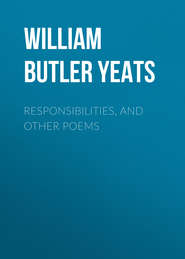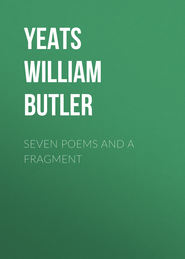По всем вопросам обращайтесь на: info@litportal.ru
(©) 2003-2024.
✖
Per Amica Silentia Lunae
Настройки чтения
Размер шрифта
Высота строк
Поля
But certainly it is always to the Condition of Fire, where emotion is not brought to any sudden stop, where there is neither wall nor gate, that we would rise; and the mask plucked from the oak-tree is but my imagination of rhythmic body. We may pray to that last condition by any name so long as we do not pray to it as a thing or a thought, and most prayers call it man or woman or child:
“For mercy has a human heart,
Pity a human face.”
Within ourselves Reason and Will, who are the man and woman, hold out towards a hidden altar, a laughing or crying child.
XXI
When I remember that Shelley calls our minds “mirrors of the fire for which all thirst,” I cannot but ask the question all have asked, “What or who has cracked the mirror?” I begin to study the only self that I can know, myself, and to wind the thread upon the perne again.
At certain moments, always unforeseen, I become happy, most commonly when at hazard I have opened some book of verse. Sometimes it is my own verse when, instead of discovering new technical flaws, I read with all the excitement of the first writing. Perhaps I am sitting in some crowded restaurant, the open book beside me, or closed, my excitement having over-brimmed the page. I look at the strangers near as if I had known them all my life, and it seems strange that I cannot speak to them: everything fills me with affection, I have no longer any fears or any needs; I do not even remember that this happy mood must come to an end. It seems as if the vehicle had suddenly grown pure and far extended and so luminous that one half imagines that the images from Anima Mundi, embodied there and drunk with that sweetness, would, as some country drunkard who had thrown a wisp into his own thatch, burn up time.
It may be an hour before the mood passes, but latterly I seem to understand that I enter upon it the moment I cease to hate. I think the common condition of our life is hatred – I know that this is so with me – irritation with public or private events or persons. There is no great matter in forgetfulness of servants, or the delays of tradesmen, but how forgive the ill-breeding of Carlyle, or the rhetoric of Swinburne, or that woman who murmurs over the dinner-table the opinion of her daily paper? And only a week ago last Sunday, I hated the spaniel who disturbed a partridge on her nest, a trout who took my bait and yet broke away unhooked. The books say that our happiness comes from the opposite of hate, but I am not certain, for we may love unhappily. And plainly, when I have closed a book too stirred to go on reading, and in those brief intense visions of sleep, I have something about me that, though it makes me love, is more like innocence. I am in the place where the daemon is, but I do not think he is with me until I begin to make a new personality, selecting among those images, seeking always to satisfy a hunger grown out of conceit with daily diet; and yet as I write the words, “I select,” I am full of uncertainty, not knowing when I am the finger, when the clay. Once, twenty years ago, I seemed to awake from sleep to find my body rigid, and to hear a strange voice speaking these words through my lips as through lips of stone: “We make an image of him who sleeps, and it is not him who sleeps, and we call it Emmanuel.”
XXII
As I go up and down my stair and pass the gilded Moorish wedding-chest where I keep my “barbarous words,” I wonder will I take to them once more, for I am baffled by those voices that still speak as to Odysseus but as the bats; or now that I shall in a little be growing old, to some kind of simple piety like that of an old woman.
May 9, 1917.
EPILOGUE
My Dear “Maurice” – I was often in France before you were born or when you were but a little child. When I went for the first or second time Mallarmé had just written: “All our age is full of the trembling of the veil of the temple.” One met everywhere young men of letters who talked of magic. A distinguished English man of letters asked me to call with him on Stanislas de Gaeta because he did not dare go alone to that mysterious house. I met from time to time with the German poet Doukenday, a grave Swede whom I only discovered after years to have been Strindberg, then looking for the philosopher’s stone in a lodging near the Luxembourg; and one day in the chambers of Stuart Merrill the poet, I spoke with a young Arabic scholar who displayed a large, roughly-made gold ring which had grown to the shape of his finger. Its gold had no hardening alloy, he said, because it was made by his master, a Jewish Rabbi, of alchemical gold. My critical mind – was it friend or enemy? – mocked, and yet I was delighted. Paris was as legendary as Connaught. This new pride, that of the adept, was added to the pride of the artist. Villiers de L’Isle Adam, the haughtiest of men, had but lately died. I had read his Axel slowly and laboriously as one reads a sacred book – my French was very bad – and had applauded it upon the stage. As I could not follow the spoken words, I was not bored even where Axel and the Commander discussed philosophy for a half-hour instead of beginning their duel. If I felt impatient it was only that they delayed the coming of the adept Janus, for I hoped to recognise the moment when Axel cries: “I know that lamp, it was burning before Solomon”; or that other when he cries: “As for living, our servants will do that for us.”
The movement of letters had been haughty even before Magic had touched it. Rimbaud had sung: “Am I an old maid that I should fear the embrace of death?” And everywhere in Paris and in London young men boasted of the garret, and claimed to have no need of what the crowd values.
Last summer you, who were at the age I was when first I heard of Mallarmé and of Verlaine, spoke much of the French poets young men and women read to-day. Claudel I already somewhat knew, but you read to me for the first time from Jammes a dialogue between a poet and a bird, that made us cry, and a whole volume of Peguy’s Mystère de la Charité de Jeanne d’Arc. Nothing remained the same but the preoccupation with religion, for these poets submitted everything to the Pope, and all, even Claudel, a proud oratorical man, affirmed that they saw the world with the eyes of vine-dressers and charcoal-burners. It was no longer the soul, self-moving and self-teaching – the magical soul – but Mother France and Mother Church.
Have not my thoughts run through a like round, though I have not found my tradition in the Catholic Church, which was not the church of my childhood, but where the tradition is, as I believe, more universal and more ancient?
W. B. Y.
May 11, 1917.
notes
1
Translated by Arthur Symons from San Juan de la Cruz.
2
I have no better authority for Caesarea than Landor’s play.











